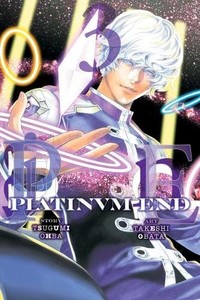Review
by Nick Creamer,Platinum End
GN 3
| Synopsis: |  |
||
The competition for godhood has entered a deadly new phase. In the wake of Metropoliman's grand entrance, it's become clear that some candidates will use any means necessary to eliminate their rivals. Mirai and Saki are at a loss for how to fight back against this new threat, but before they can come up with a plan of action, a stranger with angel wings knocks on Mirai's window. Demanding Mirai strike him with a red arrow, this strange man seems determined to join Mirai and Saki's alliance. But what reason does this man have for joining them, and can his support possibly help them face Metropoliman? |
|||
| Review: | |||
In many ways, Platinum End feels like a rewrite of Death Note. From its death game premise to its fantastical but tightly constrained powers, focus on identity puzzles, and grim reflections on morality, many elements of Platinum End feel like a recalibration of Ohba's first hit, an alternate take on the same genre space. Platinum End's third volume certainly doesn't escape Death Note's shadow, but succeeds mightily by doing the exact opposite. Having at last acquired a genre-appropriate hero, Platinum End finally feels like the confident thriller it's always wanted to be. Protagonist Mirai is one of the main variables that's up until now separated Platinum End from Death Note. In contrast with Light Yagami's eagerness to murder and general confidence in his own morality, Mirai is plagued by doubts, and unable to kill others even when it's immediately clear that doing so will prevent further tragedy. This shift hasn't really increased the story's moral complexity, but it has made it consistently difficult for Mirai to feel like an active player in his own story. In light of that, volume three's introduction of new ally Nanato Mukaido is exactly the shift this story needed. Burdened with a terminal cancer death sentence even before he became a candidate, Mukaido is ready to do whatever is necessary to ensure a better world for his surviving family. The first half of this volume essentially acts as Mukaido's protagonist job interview, where he aces all questions through a combination of fun tactical discourse, grim proclamations about Metropoliman's nature, and general reflections on what he wants his life to be worth. Mukaido is honorable, strategically minded, and ready to kill. His arrival is exactly the jolt in the arm Platinum End needed. Seemingly intimidated by this new rival's wow factor, Metropoliman also steps up his game this volume, granting god-level powers to a serial killer and letting his enemies clean up the wreckage. Neither Metropoliman nor serial killer “Girl A” are figures of significant moral complexity - Metropoliman does have a fridged sister he's very sad about, but on the whole, they are pretty much just gleeful agents of hedonism and chaos. And for a story like this, their over-the-top evil is a perfect counterpoint to our heroes. As the body count rises and Girl A luxuriates in murder, Platinum End reaches a thrilling and consistent tenor of pulpy, melodramatic fun. Ohba's increasingly energetic storytelling is matched by some of Obata's best work on the series so far. After the first volume's beautiful angelic setpieces, it seemed like Platinum End might fall into unfortunate talking-head territory, the simplicity of its powers leaving little room for visual flourish. This volume proves that to be absolutely not the case. Whether he's depicting Girl A's murders, Mirai's anxieties about killing, or simply Metropoliman's flowing locks, volume three sings with great visual setpieces. There are dramatic explosions and cool costumes and wickedly evil expressions, all lovingly captured by Obata's incredibly precise pen. Overall, Platinum End's third volume is easily its best volume so far, and the first volume that I'd say moves this from an interesting series into a genuinely strong one. While the story's philosophical pretensions continue to be muddy, this volume's focus on thrilling dramatic setpieces and its emphasis on new hero Mukaido seem to indicate this team really understands what this story is good at. I can only hope things get even more exciting from here. |
| Grade: | |||
|
Overall : A-
Story : B+
Art : A
+ The most exciting dramatic sequences yet matched with the most beautiful art, thrilling and bloody entertainment |
|||
|
discuss this in the forum (3 posts) |
this article has been modified since it was originally posted; see change history |
|||
| Production Info: | ||
|
Full encyclopedia details about Release information about |
||